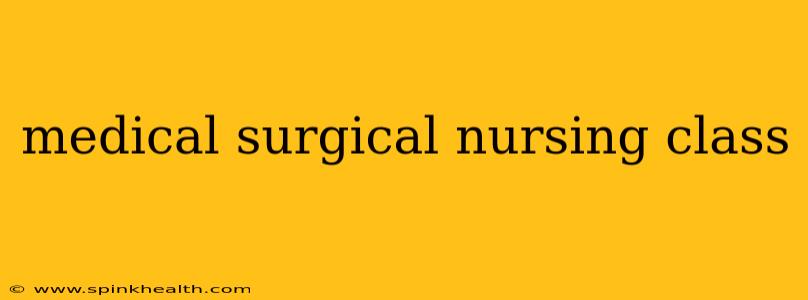Navigating the World of Medical-Surgical Nursing: A Journey Through the Classroom and Beyond
The crisp scent of antiseptic, the rhythmic beeping of heart monitors, the hushed urgency of a code blue – these are just a few of the sensory experiences that come to mind when picturing the world of medical-surgical nursing. Stepping into a medical-surgical nursing class is like stepping onto the bridge of a ship, ready to navigate the complex and ever-changing waters of patient care. This isn't just about learning procedures; it's about developing a deep understanding of human physiology, pathophysiology, and the emotional tapestry of patient experiences. Let's embark on a journey through what you can expect from this pivotal course.
What exactly is covered in a medical-surgical nursing class?
A medical-surgical nursing class provides a comprehensive overview of the principles and practices involved in caring for adult patients with a wide range of medical and surgical conditions. Imagine it as a masterclass in adult patient care, building upon your foundational nursing knowledge. You'll delve into the intricacies of various body systems, exploring how disease processes affect them and the nursing interventions needed to promote healing and recovery. Expect detailed study of:
- Fundamentals of nursing care: This includes assessment, planning, implementation, and evaluation – the cornerstone of all nursing practice. You’ll refine your skills in physical assessment, medication administration, wound care, and infection control.
- Disease processes: The curriculum delves into the pathophysiology of common medical and surgical conditions, equipping you with the knowledge to understand the "why" behind patient symptoms and treatments. Expect to explore cardiovascular diseases, respiratory illnesses, gastrointestinal disorders, endocrine imbalances, neurological conditions, and much more.
- Surgical interventions: You’ll learn about various surgical procedures, post-operative care, and the potential complications that may arise. Understanding the surgical process allows for better patient advocacy and care coordination.
- Pharmacology: A solid understanding of medications and their effects is paramount. You'll explore various drug classes, their mechanisms of action, side effects, and nursing implications.
- Technology and equipment: Medical-surgical nursing utilizes a vast array of technology and equipment. You'll learn to operate and maintain these tools safely and effectively.
What are the challenges of a medical-surgical nursing class?
Let's be honest, medical-surgical nursing isn't a walk in the park. The sheer volume of information can be overwhelming, requiring dedication and a structured approach to learning. You'll face challenges like:
- The breadth of the subject matter: The curriculum covers numerous conditions and interventions, requiring a deep understanding of complex physiological processes.
- Clinical skills development: Mastering clinical skills like IV insertion, wound care, and medication administration requires practice and precision.
- Time management: Balancing coursework, clinical rotations, and personal responsibilities demands exceptional organizational skills.
- Emotional resilience: Witnessing patient suffering and dealing with challenging situations requires strong emotional resilience and coping mechanisms.
What kind of skills will I learn in medical-surgical nursing?
Beyond the theoretical knowledge, this class hones critical skills vital for a successful nursing career:
- Critical thinking and problem-solving: You'll learn to analyze patient data, identify potential problems, and develop appropriate nursing interventions.
- Communication and collaboration: Effective communication with patients, families, and other healthcare professionals is essential.
- Time management and organization: Prioritizing tasks, managing your time effectively, and staying organized are crucial skills in a fast-paced healthcare environment.
- Adaptability and flexibility: Medical-surgical nursing demands adaptability to changing patient conditions and unexpected situations.
What are some common medical-surgical nursing diagnoses?
Medical-surgical nursing often involves diagnosing and managing a broad range of patient conditions. Common nursing diagnoses frequently encountered include:
- Ineffective breathing pattern: This diagnosis addresses respiratory issues requiring intervention to improve oxygenation.
- Impaired gas exchange: This focuses on oxygenation problems stemming from various underlying conditions.
- Decreased cardiac output: This indicates a reduction in the heart's ability to pump blood effectively.
- Risk for infection: This highlights the potential for infection and necessitates preventive measures.
- Acute pain: This is a common diagnosis, necessitating thorough pain assessment and management strategies.
This is not an exhaustive list, but it represents the type of nuanced thinking crucial to medical-surgical nursing.
What kind of jobs can I get after taking a medical-surgical nursing class?
A medical-surgical nursing class is often a stepping stone to various career paths. The skills and knowledge gained are transferable to a wide variety of roles, including:
- Staff nurse in a hospital setting: This is the most common path, working directly with patients in various medical-surgical units.
- Ambulatory care nurse: Working in clinics and outpatient facilities.
- Home health nurse: Providing care to patients in their homes.
- Long-term care nurse: Caring for patients in nursing homes or assisted living facilities.
- Further specialization: This course provides a solid foundation for further specialization in areas like oncology, cardiology, or critical care.
The journey through a medical-surgical nursing class is challenging but undeniably rewarding. It's a journey of continuous learning, personal growth, and the profound satisfaction of making a real difference in the lives of others. The skills you acquire will equip you to navigate the complexities of patient care with confidence and compassion, setting you on a path toward a fulfilling and impactful career in nursing.

